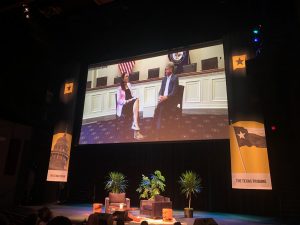ICYMI: Chairman McCaul Interview with Jenny Leonard at Texas Tribune Festival
Washington, D.C. – House Foreign Affairs Committee Chairman Michael McCaul sat down with Bloomberg reporter Jenny Leonard at Texas Tribune Festival to discuss the Putin regime’s unprovoked war of aggression against Ukraine, the administration’s weak foreign policy toward our greatest foreign adversaries, and the impact of McCaul’s CHIPS Act. Due to last minute vote changes, the interview was conducted remotely in Washington, D.C.

On the war in Ukraine:
“When I was in Asia, every leader said what happens in Ukraine will directly impact Chairman Xi’s calculation, whether to invade Taiwan. So that takes it from the European theater now into the Pacific… And if it’s not met with deterrence, you know when you project weakness, you invite aggression historically. I personally think after Afghanistan – after the debacle in the fall, and the surrender to the Taliban – that we were projecting weakness. And just months after that fall, I saw on the satellite imagery the Russian federation moving toward Ukraine. We knew then that the invasion was going to happen. And what else did we see? [at the] Beijing Olympics, Chairman Xi … and Putin cut this unholy alliance. And they are in this together and so is the Ayatollah and so is Kim Jong Un. So you can’t look at this just in the prism of Ukraine. It has a broader geopolitical challenge to it.”
On keeping U.S. tech out of the hands of the Chinese military:
“It worries me when I see things like the hypersonic weapon that was launched by China that went around the world with precision and landed, that can carry a nuclear pay load that we can’t stop. And we don’t have one. We are building this stuff out at Texas A&M’s Rellis campus. However, this is the irony of ironies. The export control laws. Guess where [China] got the technology to build the hypersonic weapon? It’s built on the backbone of American technology. The spy balloon that they allowed to traverse across the continent before it was shot down? We found American component parts in the spy balloon. … They are very good at stealing our technology and intellectual property. My last point is: OK, they are stealing it, but for God’s sake, we don’t have to sell it to them.”
On engaging in U.S. diplomacy from a position of strength:
“I’m all for talking. I think it’s healthy. What I’m critical of is the administration has made concession after concession just to get to the table. That’s a bad negotiation. It’s like the Iran deal that just got cut. It was a horrible negotiation. You don’t make concessions just to sit down with someone, just to then make more concessions. And that’s really what I see is they haven’t gotten anything out of these talks other than a nice toast. And I think it’s always good to have that conversation, but at what price? And you don’t stop your export controls. You don’t stop presidential draw down to Taiwan just to have talks. So I question that … you just can’t be naïve.”
On supporting Taiwan:
“Why is Taiwan important? Well, if you don’t care about freedom and democracy and human rights, there’s another factor. TSMC. It produces 90% of the advanced semiconductor chips for the world. Let’s say after the Taiwanese presidential, President Tsai’s party wins, and Chairman Xi decides it’s time. He will go in with a blockade. He will cut the sea cable to the island, massive cyber-attack, and then he owns or brakes 90% of the advanced semiconductor chip manufacturing for the world. If we thought Covid was bad, without semiconductor chips, nothing operates. And that’s why I introduced my chips bill at the urging of the previous administration, really based on national security grounds, to pull the supply chain out.
###